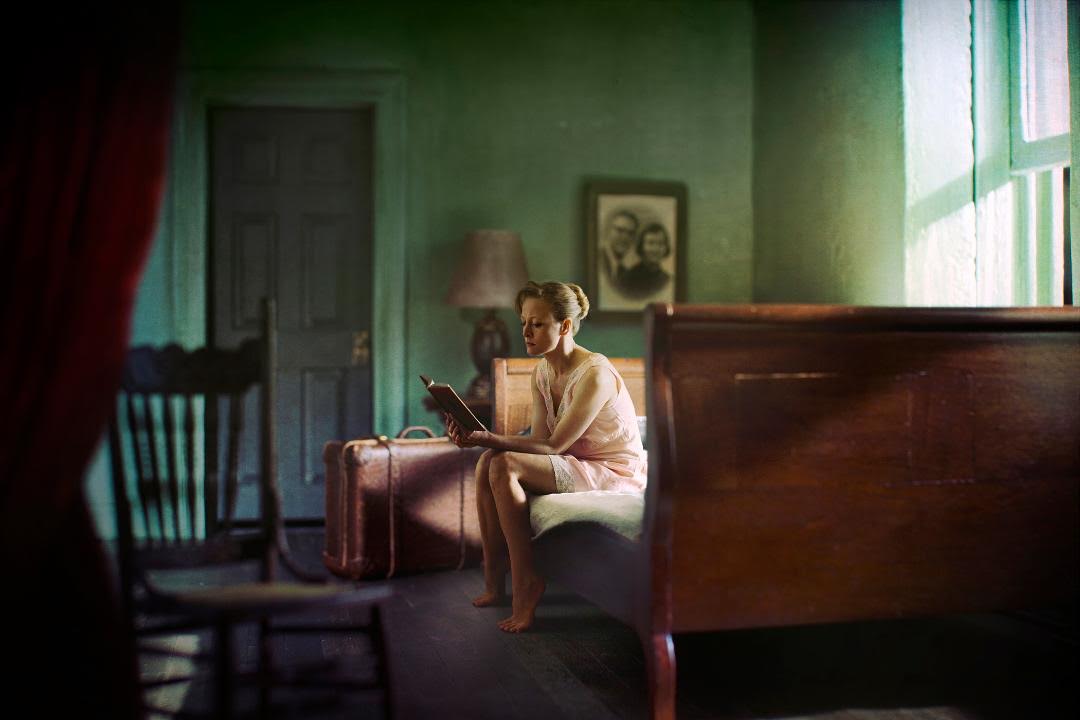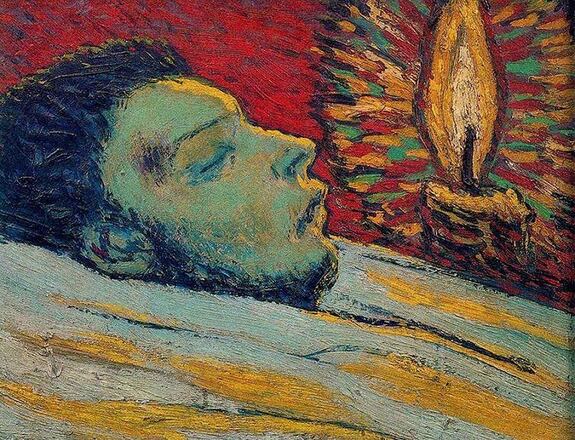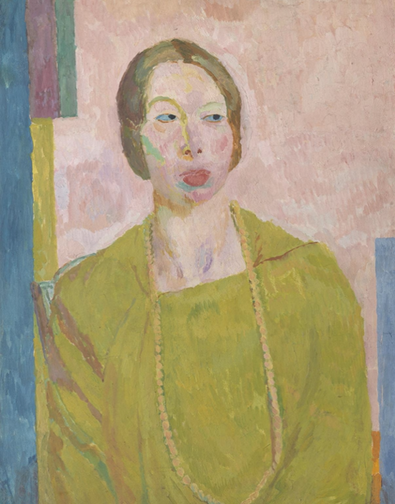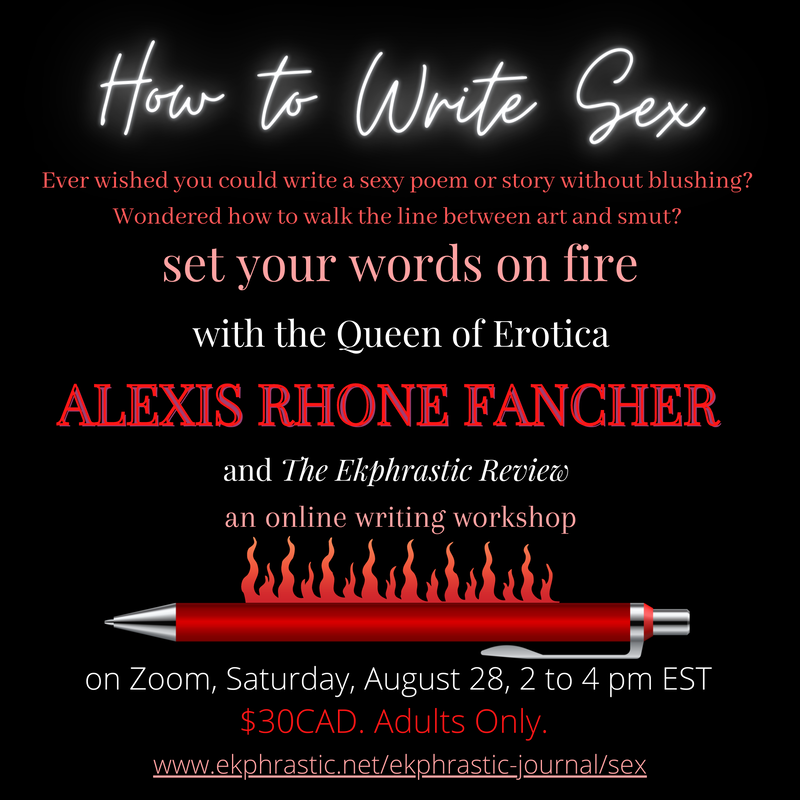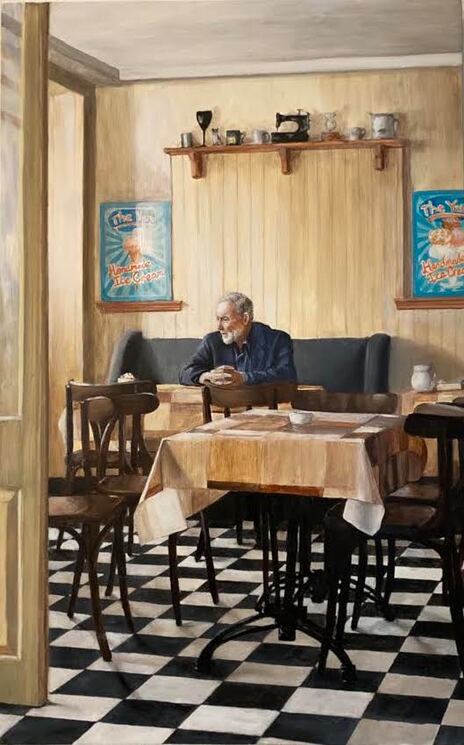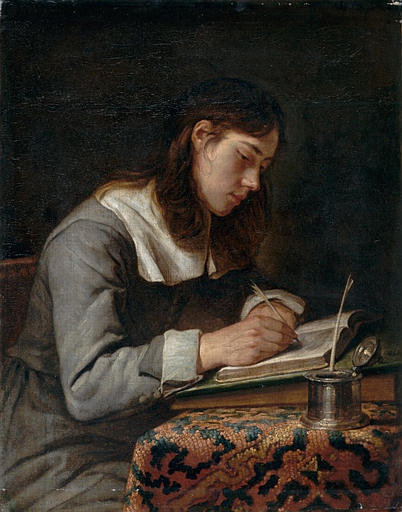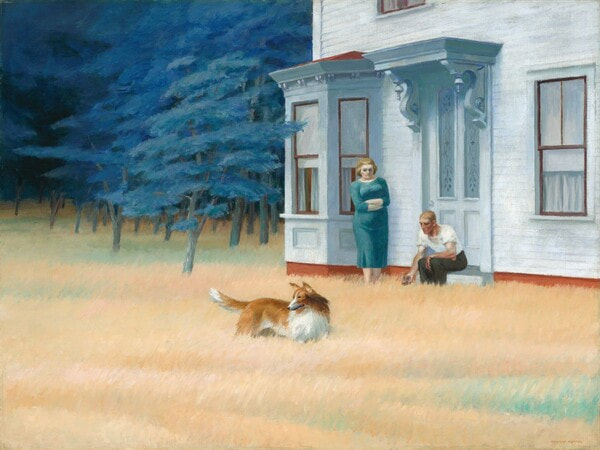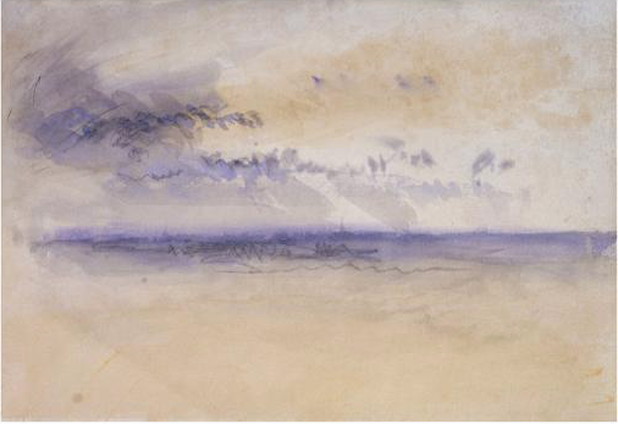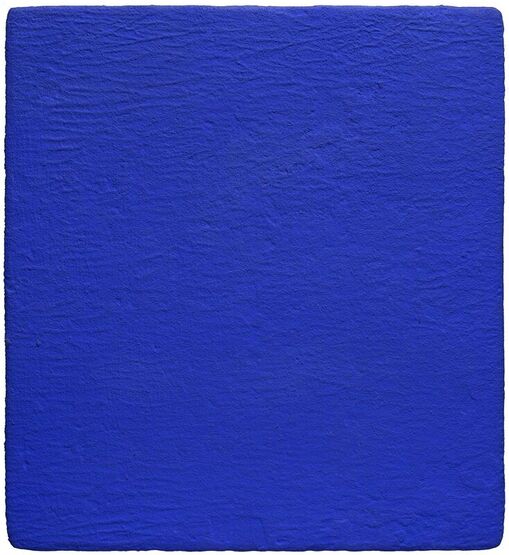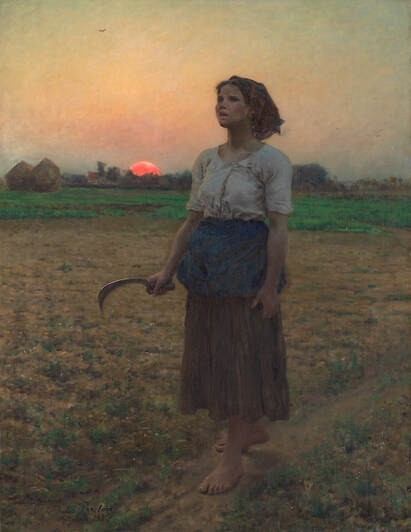|
A Quiet Sense of Drama In a moment, the woman will rise, turn her book on its face and pace. Perhaps she’ll lift her suitcase onto the bed and pack or unpack. Silk stockings, pink slip, high heels, perhaps she has just arrived, anxious to land on the next poem. Or perhaps she is waiting to be collected and delivered to airplane or train. If she reads, time is less fidgety. But just maybe this was her childhood home. Her bedroom, now stripped of cherished mementoes, impersonal, even her ghost exorcised. Perhaps one of her parents has died, and she’s come to pay last respects. Perhaps she reads to avoid the portrait of them on the wall to her right. If she looks down, she doesn’t have to feel. But just maybe this is an indifferent bed and breakfast where loneliness has driven her to find comfort in poetry? It must be poetry, such a slim volume. Poems of grief or consolation or perhaps even hope. Do the metaphors weigh on her? The heaviness of the human condition? When I read William Soroyan’s Human Comedy in high school, my ignorance of existential angst veiled the inexplicable-- abandonment and aloneness. That’s what draws me to this woman now, a solemnness in her face, her absorption in words, an intimate world reminiscent of Edward Hopper. But the photographer proposes further dimension, almost lifelike. The woman could rise and walk out of the room while Hopper’s people lie flat on the canvas, forever captured in the paint’s pigment. No matter, both evoke scenarios. A lifetime unfolds without beginning or end in a single image. Sandi Stromberg Read more of Sandi's ekphrastic works here. Richard Tuschman began experimenting with digital imaging in the early 1990s, developing a style that synthesized his interests in photography, painting, and assemblage. His award-winning work has been exhibited widely, both in the US and internationally, including the Museum of Contemporary Art in Krakow, Poland, AIPAD in NYC, and the Photovisa Festival in Krasnodar, Russia. He was named a New York Foundation for the Arts Fellow in Photography in 2016. He currently lives and works in New York City. Sandi Stromberg’s poetry has been nominated twice for a Pushcart Prize and for 2020 Best of the Net. She is a dedicated contributor to The Ekphrastic Review and recently contributed a Throwback Thursday (May 22). In 2021, the Review awarded her a Fantastic Ekphrastic Award for her contributions to the genre. Her poetry has appeared in many small journals and anthologies, including San Pedro River Review, The Ocotillo Review, Houston Chronicle-San Antonio Express-News, Words & Art, Visual Verse, Weaving the Terrain, Enchantment of the Ordinary, and in Dutch in the Netherlands in Brabant Cultureel and Dichtersbankje (the Poet’s Bench).
1 Comment
My Paris Birthday In the early morning, mother and I stroll the Catacombs. Empty skulls stacked fifty deep. In each, five dark openings to take life in, let breath out. A beetle crawls through a bullet hole. In the Picasso Museum, Carlos Casagemas, captive of Picasso’s canvas, longs to cover the gunshot wound to his temple. His blood flows forever for all to see. The beginning of his Blue Period says the docent. Testimony to my Love’s rejection mumbles Carlos. At the Opera House, Salome kisses the lips of the saint’s severed head plated for her pleasure. Music of her savage desire scored by Strauss. Where is my cake? Where is my celebration? In Place Dauphine, a lone bird defecates on my yellow hair. My mother, whose blood runs black with disease, toasts my good fortune. On the day of my birth, in the city of lights, I see only death, my dying mother, only luminance. Merna Dyer Skinner This poem was previously published in the author's chapbook, A Brief History of Two Aprons, Finishing Line Press, 2016. Merna Dyer Skinner is the eighth-generation granddaughter of Quaker martyr Mary Barrett Dyer. Her chapbook, A Brief History of Two Aprons, was published in 2016 by Finishing Line Press. Individual poems appear in literary journals including Mojave River Review, Silver Birch Press, Star 82 Review, and in the 2019 anthology, Pocket Poems. Forthcoming, in 2021, The Poeming Pigeon’s anthology From Pandemic to Protest will include two of her poems. She is an alumna of the Kenyon Review Poetry Workshop, Tupelo Press Workshop, and Community of Writers. She holds an MA in Communication Studies from Emerson College. She’s lived in six U.S. states, and traveled to five continents. How Shall I Paint You, Mrs St John Hutchinson? Not enough to clasp stockinged legs about my husband’s torso, you arrive like a crested chameleon in the studio. I hoist a horse-hair brush to the canvas, experiment with two black dots: button-eyes baleful in pools of teal. Your mouth, your tinkly hostess mouth, I paint, a giant crimson fruit, a plashy place to kiss. Below the fatter, bottom lip, I trawl a gash of blue: suggestion of wetness. Your ochre dress, the one I picked for you to wear, is cut square about rippled neck. The body’s void I fill with colour, force nipples and breasts to disintegrate into flatness. And skin, your sly mistress-skin blotches in blancmange pink. Who was it said you looked like an Arab horse or pierrot the day you came for tea with Clive (and me) decked in lemon trousers, green ribbons, a yellow turban pinned to your pencil-parted hair? I forget. At this easel, overlooking the square, the artist makes you recognisable: a wife portrays the hideous. Estelle Price Estelle Price has an MA in Creative Writing from the University of Manchester. She is the winner of the 2018 Book of Kells Writing Competition and her poetry has been placed or listed in the National Poetry Competition, Bridport Prize, Canterbury Poet of the Year, Much Wenlock, the London Magazine, Yorkmix, Manchester Cathedral, Segora, Wells, Plough, Bangor, Vers, Welshpool and other poetry competitions. Poems have also appeared in Poetry Wales, The Lake (forthcoming), Marble Poetry (forthcoming), Paper Swans Pocket Book of Weddings Anthology, Three Drops from a Cauldron and Stony Thursday Book anthologies, the Smith |Doorstep The Result is What you See Today Anthology, Macunian Ways Anthology and Deep Time Volumes 1 and 2. She lives in Cheshire in the UK. Oh, yes, we did... Alexis Rhone Fancher, author of Erotic: New and Selected, is our guest judge for the Ekphrastic Sex contest. We are absolutely thrilled that she is joining us for a very special online workshop on How to Write Sex!!!!! Alexis will share some of her ekphrastic sex poetry, tell us about her experiences as an erotic writer, and offer tips you can use in your own practice to set your words on fire! The workshop is Saturday, August 28, 2021 at 2 pm to 4 pm EST. $30CAD. Adults only. Alexis Rhone Fancher is the author of Erotic: New and Selected (NYQ Books); How I Lost My Virginity to Michael Cohen & other heart stab poems (Sybaritic Press); Enter Here (KYSO Flash), and other books. Since 2013, she has been nominated 29 times for the Pushcart Prize, 1 Best Short Fiction award, 1 Best Micro-Fiction award, and 6 Best of the Net awards. In 2018 she won The Pangolin Prize for Poetry. Her poem, “when I turned fourteen, my mother’s sister took me to lunch and said:” was chosen by Edward Hirsch for inclusion in The Best American Poetry of 2016. Her poems and flash fiction have been published in over 200 literary magazines and journals, including: RATTLE, Verse Daily, VOX POPULI, Slipstream, Spillway, The American Journal of Poetry, The Pedestal Magazine, The MacGuffin, Hobart, The Ekphrastic Review, and more. She is also a photographer, known for her studio portraits of writers and her California street photography, published world wide. She and her husband live and collaborate on the bluffs of San Pedro, CA, twenty five miles from downtown L.A. They have a spectacular view. Alexis Rhone Fancher, from The Fem: "I write about women like me, women who own their sexuality and take responsibility for their choices. It may seem I'm writing about sex, but really, I'm writing about power. Who has it. How to get it. How to wield it. How to keep it." Click here, or on image above, to read the selected responses to the ekphrastic challenge for this painting.
Our third Sunday Session is happening this Sunday afternoon, August 15 at 2 pm EST. These workshops are an opportunity for the ekphrastic community to gather together, write together, learn more about art, share if so inspired, and meet each other. We have an incredible lineup of prompts and activities this week! We have announced September dates for another Sunday session, a Wine and Art Write Night, and a moon themed workshop. Click here to see all of the sessions that are coming up.
Threshold Whether to leave now while dry evening light whiffles grass to flax, or wait until creeping trees smother them slowly with untold dark. The stone is the weight of his curved hand, a decision too heavy to throw. His dog swithers between elsewhere and here, suspended hesitation. Look how she looms against the house, a cross-armed dourness dressed in township green, cumbersome with questions. Tight-lipped brooding draws us to her face, she knows the debtor’s score. See how one leg advances yet her stock-still body holds her waiting words. Walls, blind windows, empty door. He sits upon the step in singlet, pants, indecisions in white and black, staying that listless flex of sun-burned arm before his final thought is formed. Whether to leave or stay depends on this desperate drought of homestead air, on the balance of one bone-hard stone. Mary Gilonne Mary is a translator living in France for many years but originally from Devon, U.K. She has won the Wenlock, Segora, Wirral and Sentinel prizes, and been placed or commended in many others. Her work can be read in Magma, Antiphon, Spontaneity, Snakeskin, Unbroken, Fenland Review, The Curlew etc., and in several anthologies. Her pamphlet Incidentals is published by 4Word Press. The Sea’s Treatise I entered the world already wed―bound to sky, my fathomless other. We were one continuous shimmer over the land; a blue bliss of wind and current, gannet and manta. On the third day, divided; or so it was written. The seam at the farthest edge of your vision― horizon―an illusion, for day and night we brush against one another at that imaginary parallel. Even clothed in gloom, she falls upon me, rides me into swells, into motion. Her moods colour mine. God is not that pitiless. Barbara Sabol Barbara Sabol's fourth poetry collection, Imagine a Town, was awarded the 2019 Sheila-Na-Gig Editions Poetry Prize. Her poetry has appeared most recently in Mezzo Cammin, Evening Street Review, and The Copperfield Review. Barbara’s awards include an Individual Excellence Award from the Ohio Arts Council. She conducts poetry workshops for community literary organizations. Barbara lives in Akron, OH with her husband and wonder dogs. Cut with the Cake Knife Everything is always falling apart. I bake a three-layer cake, chocolate frosting, and when I cut it, a leopard attacks me. Last night my husband and I decided to get romantic instead of watching a rerun of The Beverly Hillbillies. When we kissed, the living room became a tilt-a-whirl. Love can make us dizzy. My friend Carnal says she climbed a pine, got struck by lightning, and now can read the minds of morning glories. I may try to bake a new cake. I’ll be careful, but careful gets distracted. I’d like everything to turn out well. Who doesn’t? Next time the leopard may snuffle and rub up against my leg. Kenneth Pobo Read Kenneth's poem after Remedios Varo here. Kenneth Pobo is the author of twenty-one chapbooks and nine full-length collections. Recent books include Bend of Quiet (Blue Light Press), Loplop in a Red City (Circling Rivers), Dindi Expecting Snow (Duck Lake Books), Wingbuds (cyberwit.net), and Uneven Steven (Assure Press). Opening is forthcoming from Rectos Y Versos Editions. For the past thirty-plus years he taught at Widener University and retired in 2020. The Song of the Lark She stands between sky and earth, implanted in the solidness of the ground which cannot betray her step. The earth is firm, solid, stable. It responds predictably to her care, varying only according to the vagaries of weather, crop disease, insects, and wind. The slightest of breezes causes her to pause. She looks up, and hears that piercing tune, ecstatic requiem, achingly sweet. Sick for home, her sad heart pains, with delight and melancholy and sehnsucht and yearning to capture that bird, cage it, and hear it always. But enclosed, its plaintive anthem would fade. Safe and shut off, that wild beauty tamed would lose its immortality. Only free, uncircumscribed from human confines, can that voice be uttered because it cannot be captured because it is ephemeral because the memory of it is eternal like the field she stands rooted in. She -- grounded in the earth, attuned to heaven -- seems more real, more substantial than I. Am I just a dream, a trick of the light you see out of the corner of your eye? A floater which sometimes crosses your vision forcing you to perceive it until it breaks up and, dissolving, enters your body? Could I be like her? Let me stay grounded. Ground me. Or else that piercing voice, opening magic casements, will cause me to rise, levitate, into the air. Can you hear it—that song? Do you sense it—my voice? Are you pulling me back to earth? Or are you floating up with me? Susan Signe Morrison Read Susan's essay on Ernst Barlach's sculpture here. Writing on topics lurking in the margins of history, novelist and medievalist Susan Signe Morrison is University Distinguished Professor of English at Texas State University. She has published poetry in Mothering, Presence, The Ekphrastic Review, ISLE (Interdisciplinary Studies in Literature and Environment), and Taj Mahal Review. |
The Ekphrastic Review
COOKIES/PRIVACY
This site uses cookies to deliver your best navigation experience this time and next. Continuing here means you consent to cookies. Thank you. Join us on Facebook:
Tickled Pink Contest
April 2024
|
